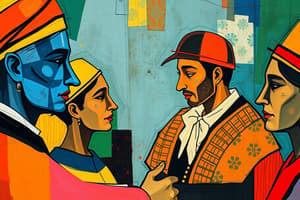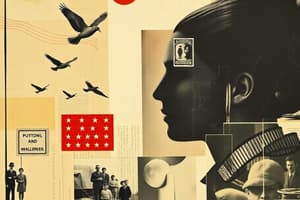Podcast
Questions and Answers
What is the sociological definition of culture?
What is the sociological definition of culture?
- The formal laws enacted by a government.
- A set of beliefs that are only verbally communicated.
- A system of learned and shared behaviors. (correct)
- A collection of traditions passed down through generations.
Which of the following statements best describes the role of symbols in culture?
Which of the following statements best describes the role of symbols in culture?
- Symbols help people understand the world by conveying recognizable meanings. (correct)
- Symbols have no impact on understanding shared experiences.
- Symbols are only relevant in legal contexts.
- Symbols are defined only through verbal communication.
Which of these is a characteristic of folkways?
Which of these is a characteristic of folkways?
- They are formal, written rules.
- They represent casual social norms of a culture. (correct)
- They are considered sacred and untouchable.
- They carry legal penalties when violated.
What are laws in the context of sociological norms?
What are laws in the context of sociological norms?
How does the Consensus model of crime view culture?
How does the Consensus model of crime view culture?
What does China's Elderly Law primarily aim to protect?
What does China's Elderly Law primarily aim to protect?
What best defines ethnocentrism?
What best defines ethnocentrism?
Which of the following is an example of a taboo?
Which of the following is an example of a taboo?
What is the main characteristic of a subculture?
What is the main characteristic of a subculture?
Which of the following best describes 'culture shock'?
Which of the following best describes 'culture shock'?
What is a defining feature of Amish culture?
What is a defining feature of Amish culture?
What role does a peer group play in socialization?
What role does a peer group play in socialization?
What is the purpose of Sanctuary Cities in relation to undocumented immigrants?
What is the purpose of Sanctuary Cities in relation to undocumented immigrants?
Which of the following accurately describes capitalism in the context of globalization?
Which of the following accurately describes capitalism in the context of globalization?
Which explanation best illustrates an agent of socialization?
Which explanation best illustrates an agent of socialization?
What is a common misconception regarding DACA?
What is a common misconception regarding DACA?
What is socialization?
What is socialization?
What is the primary focus of the nature versus nurture debate?
What is the primary focus of the nature versus nurture debate?
What is resocialization?
What is resocialization?
How does media influence social norms?
How does media influence social norms?
What is reinforcement in the context of socialization?
What is reinforcement in the context of socialization?
What was the outcome of John Money's intervention in the case of David Reimer?
What was the outcome of John Money's intervention in the case of David Reimer?
Which of these is part of the material culture socialization in the workplace?
Which of these is part of the material culture socialization in the workplace?
What is an example of nonmaterial culture in the workplace?
What is an example of nonmaterial culture in the workplace?
What is ascribed status?
What is ascribed status?
Which stage of development involves the child beginning to formulate role expectations?
Which stage of development involves the child beginning to formulate role expectations?
What defines a master status?
What defines a master status?
What is a characteristic of a total institution?
What is a characteristic of a total institution?
How does role conflict occur?
How does role conflict occur?
What is the focus of social learning theories?
What is the focus of social learning theories?
What does role strain refer to?
What does role strain refer to?
Which stage involves children learning the rules specifying the relations among players?
Which stage involves children learning the rules specifying the relations among players?
Which responsibilities are typically associated with being a parent?
Which responsibilities are typically associated with being a parent?
What does Solidarity refer to in the field of Sociology?
What does Solidarity refer to in the field of Sociology?
What does the New York State 'Code Blue' policy provide?
What does the New York State 'Code Blue' policy provide?
Under New York Squatting Laws, what happens after thirty days of occupancy by a squatter?
Under New York Squatting Laws, what happens after thirty days of occupancy by a squatter?
What defines a caste system?
What defines a caste system?
How is social class defined from Max Weber's perspective?
How is social class defined from Max Weber's perspective?
What is 'Vertical Mobility' in sociological terms?
What is 'Vertical Mobility' in sociological terms?
What was one key aspect of President Bill Clinton’s 1996 welfare reform laws?
What was one key aspect of President Bill Clinton’s 1996 welfare reform laws?
Flashcards are hidden until you start studying
Study Notes
Sociology of Culture
- Culture is a system of learned and shared behaviors, beliefs, objects, and characteristics common to a group.
- Symbols help people understand the world and communicate shared meanings, such as stop signs, police badges, and bathroom stick figures.
- Norms are rules and regulations that guide behavior, while folkways are informal customs, like shaking hands or wearing appropriate attire.
- Laws are formal, written rules, and mores are strong moral norms, violation of which can have serious consequences, such as plagiarism.
- Taboos are behaviors considered too sacred or dangerous, such as incest.
- The Consensus Model of crime suggests that society shares a common moral value system, and laws are crucial for safety and rights protection.
- China's Elderly Law protects the rights of the elderly to material assistance and prohibits discrimination, maltreatment, or disregard.
- Ethnocentrism is the belief that one's own culture is superior to others, leading to judgments like dismissing other cultures' food or opposing immigration.
- Subcultures are smaller groups within a larger culture, sharing specific identities, examples include body modification communities and LGBTQ+ groups.
- The Amish culture is characterized by isolation, rejection of modern technology, conservative dress, and a strong emphasis on community and belief-based living.
- Shunning is a method used by the Amish to address disobedient members.
- Culture shock is a sense of disorientation and anxiety when exposed to an unfamiliar way of life, like a foreign exchange student in an American classroom.
- Globalization is the integration of international trade and finance markets, often driven by capitalist expansion.
Sociology of Socialization
- Socialization is the process of learning and internalizing values, beliefs, and norms of a social group, becoming a functioning member of society.
- Socialization agents include family (first socialization), peer groups, school, workplace, religion, and media, each influencing individuals in specific ways.
- Nature refers to inherited biological factors, while nurture emphasizes environmental influences like family, education, and culture.
- Reinforcement occurs when behaviors receive direct or indirect rewards or punishments, shaping learned behavior.
- Resocialization is the process of unlearning old behaviors and learning new ones within a new environment, often stressful due to the shift in norms.
- The Brenda/David case study (David Reimer) illustrates the impact of nurture on gender identity, highlighting the consequences of imposing a chosen gender despite biological differences.
- Herbert Mead's stages of development include the preparatory (imitation), play (role expectations), and game (rule-based interaction) stages.
- Social learning theories highlight learning through observation, imitation, and modeling.
- Total institutions exercise total control over individuals' lives, examples include mental asylums, concentration camps, boot camps, convents, and monasteries.
Social Stratification in the United States
- Ascribed status is fixed at birth, based on factors like sex, age, race, and family background.
- Master status is the primary identifying characteristic of an individual, such as race, age, occupation, or sexual orientation.
- Achieved status is attained based on merit and effort, reflecting personal accomplishments and choices.
- Effective communication involves understanding tone, nonverbal cues, and body language.
- Roles are patterns of behavior associated with social status, role conflicts arise when roles contradict each other, and role strain occurs when a single role demands too much.
- Solidarity refers to a shared sense of unity and common interests within a group or class.
- New York State's Blue Code laws provide shelter for homeless people during cold winter nights (temperatures at or below 32 degrees Fahrenheit).
- New York Squatting Laws recognize squatters as legal tenants if they reside in a property for 30 days, making it crucial for landlords to act swiftly to evict them.
- Caste Systems enforce rigid social stratification, where individuals are born into a group and remain in it for life, unable to move to another.
- Max Weber defines social class based on property (wealth), power (influence), and prestige (social standing).
- Vertical mobility refers to the movement from one social status to another.
- Poverty is the state of having limited or no money, goods, or support.
- The "working poor" are those who work or seek work but remain below the poverty level.
- The U.S. poverty rate is 14.4%, while New York State's poverty rate is 15.1%.
Nickel and Dimed Introduction
- President Bill Clinton's 1996 welfare reform laws shifted the administration of social welfare programs to the states and imposed stricter requirements on recipients, including a five-year lifetime limit on benefits.
- Barbara Ehrenreich, the author of "Nickel and Dimed," had unique advantages in her experiment due to her PhD and background in biology, allowing her to secure better-paying work than available to most low-wage workers.
Studying That Suits You
Use AI to generate personalized quizzes and flashcards to suit your learning preferences.




